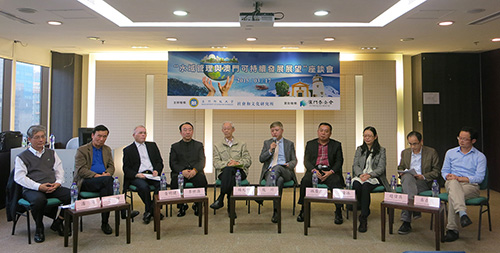The Forum on “Coastal Waters Administration and Prospects for Macao’s Sustainable Development” was held on March 17th 2015 afternoon, which was coordinated by Institute for Social and Cultural Research of Macau University of Science and Technology (MUST) and sponsored by Macau Foundation, at conference room 1117 on the 11th floor of Centro Hotline, Alameda Dr. Carlos d’Assumpcao, Macau. The forum was hosted by Professor Pang Chuan, Associate Vice President, Dean of Graduate School, Vice Dean of School of Business of MUST. Among the invited guest speakers were Professor Ieong Wan Chong from the One Country Two Systems Research Center of Macao of Polytechnic Institute, Professor Lin Guangzhi, Academic Director, Center for Macau Studies of University of Macau, Vice Director General Wang Lingbing, Association for the Promotion of Economy in Macau, Associate Professor Zhao Weibing, International Tourism Research Centre, Institute for Tourism Studies, distinguished Professor Li Shiyuan, Institute for Social and Cultural Research of MUST, distinguished research fellows Mr. Zeng Kun and Mr. Pan Hai, the latter being the Director of Zhuhai Marine Resources Protection and Development Association, Associate Professor Huang Mingjian, Assistant Dean of Faculty of Law of MUST, and Associate Professor Yi Zaicheng, the program coordinator of Faculty of Law of MUST.
During a meeting with Chief Executive Chui Sai On on December 19th 2014, Chinese President Xi Jinping announced an official initiation of relevant work for Macao’s coastal waters administration in accordance with Decision of National People’s Congress on the Establishment of the Macao Special Administrative Region of the People’s Republic of China. This decision was aimed to provide a legal basis for Macao SAR to administer its coastal waters and promote the long-term economic and social development in the region. To implement this decision, concerned departments of the local and central governments were expected to form a joint task force to work with the SAR government and complete the relevant work by the end of this year.
According to the statistics provided by Macau Statistics and Census Service, the resident population of Macao has hit 636,000 and the number of inbound tourists over the year has exceeded 31 million by the end of 2014. Professor Pang Chuan predicted that there would be a great increase in both the resident population and the number of inbound tourists for the next 20 years. According to Professor Pang, the current land and water resources in Macao would no longer support the future population growth, consequently jeopardizing the life quality of local residents and the tourist experience, as a result, inhibiting Macao from becoming a World Tourism and Leisure Center. It is urgent for Macao to seek solutions for the shortage of land and water resources. The entitlement for Macao to administer its coastal waters will undoubtedly ensure the moderate diversification of Macao’s economy and the mutually beneficial Macao-Guang Dong cooperation.
At the latest Chinese People’s Political Consultative Conference held in Beijing, some delegates from Macao co-submitted a proposal on granting Macau the right to administer its coastal waters, which also suggested that the Macao SAR government should have jurisdiction over the waters 15 meters deep in both east and south of Macao. Distinguished Professor Li Shiyuan agreed that the entitlement of Macao to manage a larger area of surrounding waters would definitely have strategically significant implications on Macao’s development for the next 30 years. Referring to the decision’s influence on Macao’s neighboring city Zhuhai, Professor Li pointed out that Macao has to be committed to the furthering of China’s national interests, and seek close cooperation with Zhuhai when pursuing further development in Macao so as to achieve a win-win situation for both areas in this regard.
Professor Ieong Wan Chong also shared his concern by saying that the coast line of Macao was 52.6 km in 2013, and the area of the coastal waters under current management is 85 km2 where the possibility of expanding the administrative waters in the north and west of Macao is slim, and it will be difficult to develop the east waters of Macao after the opening of Hong Kong-Zhuhai-Macao Bridge. So in his opinion, it will be most reasonable to moderately expand and legalize the management of the waters in the open South China Sea. However, the potential for this development is not unlimited, and it’s not realistic to solve the space constraint challenge in Macao by simply expanding the coastal waters. The actual solution requires the SAR government to do initial investigation and research, and to motivate the non-governmental forces to get involved. The positioning of the future development of Macao should be completed and optimized by combining the nation’s “One Belt, One Road” plan with the joint efforts of all forces in Macao. It is most desirable for Macao to position a development route with both Macao characteristics and lasting competitiveness by constant innovation and seeking ultimate solutions to solve the problems.
Professor Lin Guangzhi pointed out that the decision for Macao to manage and use the customary waters was made by taking into considerations the local people’s livelihood and Macao’s development need in the future. Thus the location, function and management of the waters should be decided upon and allocated in line with the Macao’s urban planning, the regional cooperation role and the goal to be the world tourism and leisure center. A full consideration should be given to the people’s livelihood in the meantime enough space should be reserved for the construction and management of projects that will turn Macao into a world-renowned tourist destination. The Macao SAR should play a more active part in research projects for the central government so that relevant laws or regulations formulated and promulgated would better meet the actual needs and sustainable development of Macao.
Vice Director General Wang Lingbing thought that the SAR government should consider this decision of the central government a golden opportunity to address and improve the problem of “governance” of Macao and to make an overall deployment regarding the urban layout and planning as well as sustainable development in Macao. On the other hand, according to Vice Director General Wang, reconstruction of the old residential areas remained difficult. Given that residents of Carlos da Maia and Areia Preta areas have made great contributions to Macao and the SAR government should seek every opportunity to reinforce the infrastructure and renew the old residential areas for more living space and better life quality for the residents.
Associate Professor Zhao Weibing also said that the administration of the coastal waters would be one crucial step for Macao to implement successfully the strategy of both inward and outward extension. It would be a historical opportunity that should not be missed and Macao should plan well before taking any action by preparing the preliminary layout plan and other alternative proposals. The Macao SAR needs to encourage various innovations in terms of diverse water-management so as to achieve a win-win situation and strengthen the regional cooperation and a closer coordination between Macao and Guang Dong (Zhuhai in particular).
When discussing the legal issues regarding Macao’s administering its coastal waters, Associate Professor Yi Zaicheng noted that within the framework of “One Country, Two Systems”, there were basically two legal issues in discussion: the first being the justification of gaining the administrative rights, which is the beginning and most basic topic in terms of legal logic if the legal issues of Macao managing its coastal waters were to be studied; the second being reasonable establishment of an administrative system if the acquisition of the administrative rights was justified. Professor Yi believed thatMacao SAR need allocate the waters pursuant to law and also take into consideration the economic objectives and well-being of its people while exercising its rights of managing the coastal waters.
Associate Professor Huang Mingjian remarked that Macao’s obtaining the waters would happen soon but the optimization of the use of waters would require more discussions. Macao’s water-management should adopt measures of green governance in order to realize the ecological value of Macao’s waters. Green governance should be the systematic choice for Macao to achieve both economic and ecological values from its coastal waters.
Concerning the future development of Macao’s water-management, Mr. Zeng Kun raised two suggestions. One is to always put the protection and management of coastal waters within the holistic strategic framework of developing coastal tourism and building circle of high-quality life. The other is to comply with the nation’s “One Belt, One Road” plan and reconstruct the “Ceramic Road” or “Incense & Porcelain Road” of the new era across the Indian Ocean, with other countries in the Persian Gulf as destinations.
From the perspective of developing marine economy, Mr. Pan Hai pointed out that it’s Macao’s root to live by the sea. Macao should make the best of this entitlement of water-management by developing marine economy focusing on marine tourism, instead of simply reclaiming the land from the sea. Therefore, serious considerations should be given to building a world-class cruise terminal, international yacht homeport base, international maritime recreation center and even investing in the development of Carat Canals.






